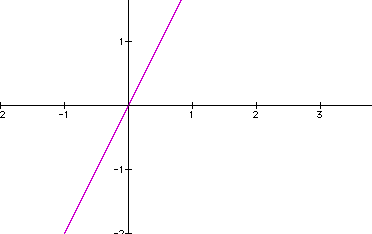
Learning about the y-intercept
Everyone is familiar with the y-axis or the vertical line on the coordinate plane. When a line is graphed on the coordinate plane, the place that it crosses this axis is called the y-intercept. For example, look at the graph of the equation y = 2x.

Notice the graph travels through the origin (0,0). The y-axis is crossed at 0, therefore the y-intercept is 0.
Now see what happens as we add or subtract a value from the x term.
 y=2x+4
y=2x+4
 y=2x-4
y=2x-4
When we added 4 to the x term, the y-intercept moved up the y-axis 4 units. When we subtracted 4 from the x term, the y-intercept moved down the y-axis 4 units.
Therefore, one can see that in the equation of a line y=mx + b, the b is the y-intercept. It tells us where the equation crosses the y-axis.